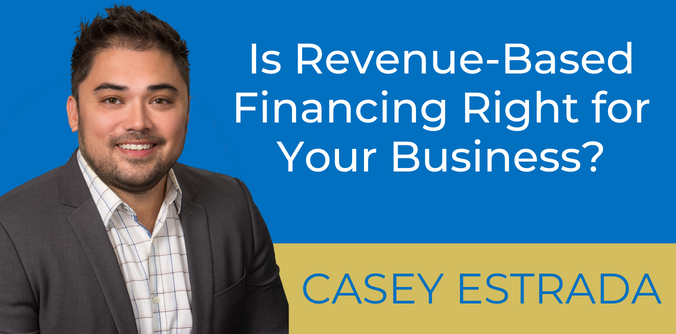Is Revenue-Based Financing a Good Fit for Your SaaS Business?
By:
Casey Estrada
At Founders First Capital Partners, we have a singular mission: to empower traditionally underserved entrepreneurs by increasing access to resources. We do this through two sides of our business: one for strategic advisory and one for growth capital resources. Today, I’m going to focus specifically to the capital side, where I lead our investment team and impact financing initiatives. This capital arm is where we have an alternative financing solution that can complement traditional funding sources like banks or equity.
What is revenue-based financing?
Founders First Capital Partners is one of a few firms that offers an alternative lending option called revenue-based financing (RBF). Many people have never heard of this type of financing, and often times merchant cash advance (MCA) or quick cash lenders calls themselves revenue-based financing when they’re not. So, what is it really? Let me paint a picture of the capital market space for you. Historically, there are traditional banks and credit unions on one side and then you have more institutional equity-based financing on the other side – both of which can be great options for small and medium-sized companies. Founders First, as an alternative lender and an impact investor, is in this innovative middle ground.
Compared to a bank, Founders First is less restrictive and more flexible: We are not an asset-based lender; meaning we’re not going to care about the value of your house or your car for collateral, nor your personal credit score. As well, we generally do not have restrictive covenants in our deals making it so you have to have to maintain a certain level of cash in the bank, as an example.
Compared to the other side of the market, we are fully non-dilutive: We’re completely out of your cap table, and not asking for any board seats, any control or any equity dilution.
What business stages are best for SaaS lending?
There are three common scenarios where we get involved with businesses:
- As the primary and singular lender for a company that has never fundraised or taken outside capital before. Maybe they’ve predominantly been bootstrapped, funded growth with their own money, friends and family money or business profits. In this scenario we can establish a relationship and act as their first long-term growth capital partner.
- We can provide funding between formal equity rounds, acting as a type of bridge or mezzanine debt. In these instances, we diversify the capital stack by adding some additional fuel on the fire to help increase their valuation and position them more favorably for their next formal equity round, all while retaining valuable ownership.
- Our money can be used to consolidate, clean up and refinance or restructure less favorable, short-term and high-interest debt like that of a merchant cash advance or quick cash loan.
In all of these scenarios, we also are very friendly with other lenders, like traditional banks and the SBA. Oftentimes, we will be able to take a second, junior or subordinated lien position in the debt stack. Meaning that if a company has an existing SBA facility or term loan from Chase as an example – assuming the debt capacity and size of the business makes sense to us – we can act as a flexible complement and sit behind these in the debt stack and help diversify the capital sources for the business.
No equity, no collateralization
We don’t have an equity upside and we don’t collateralize any personal assets. The key way we’re able to get comfortable with our SaaS lending risk and the starting point for all of our analysis is going to be predictability of your business revenue. We’re industry agnostic. Our investments run the gamut of tech-enabled or focused companies, SaaS firms, service-based businesses, light manufacturing, and consulting firms. It’s very broad, but the common denominator across the board is always going to be some level of repeatable, predictable, sticky revenue.
And that’s also how we assess debt capacity. On the investment team, we think of debt capacity for a given business as a percentage of that annual predictable revenue, typically ranging between about 15% to 30%. For example, if a company is doing $1 million in annual revenue, we might issue a $200,000 loan, which is 20%. And then that principal amount would have a predetermined and fixed repayment cap that is determined by a multiple of that principal such as 1.3 times. Multiply it together, and that equates to a $260,000 obligation over the course of a predefined term – typically 2 to 5 years. And then every month you’re making one payment.
Whether your revenue is $100,000 one month or $40,000 the next, your payment is set as a percentage of your revenues. So, you’ll pay less in a down month. Your payments will ebb and flow with your revenue. Any sort of seasonality will be reflected in the way that the loan is paid back.
Of course, there are scenarios where you under-perform or over-perform the model and it looks like you’re going to pay it off sooner than the original term, or it’s going to go a little bit longer. In either situation, we will work with the company. We might ask, “Should we refinance? Should we restructure? Should we add more capital and extend the term accordingly?” Those kinds of questions are going to be at the forefront. We don’t have an absolute maturity date with our growth capital, it’s more of a term outline. We are an impact investor at the end of the day, and we want the best outcome for the business because our goal is for diverse founders to be successful.
If you are a minority or diverse-led business owner, contact Founders First Capital Partners to learn more about RBF and how it can provide SaaS lending to grow your business.
Guest blogger Casey Estrada is the Director of Investments for Founders First Capital Partners where he works with diverse founders to scale and grow their businesses.




